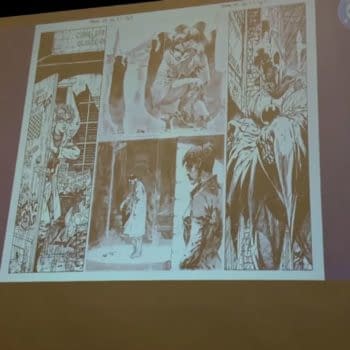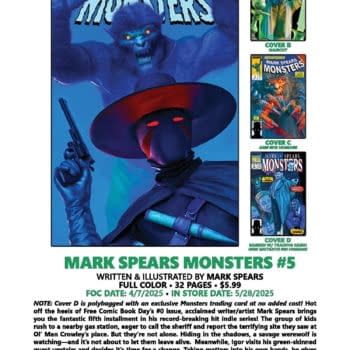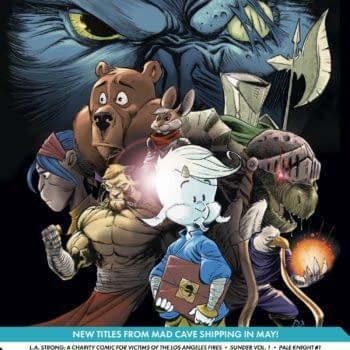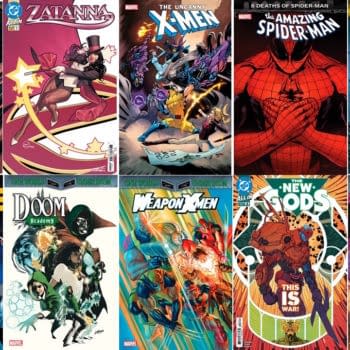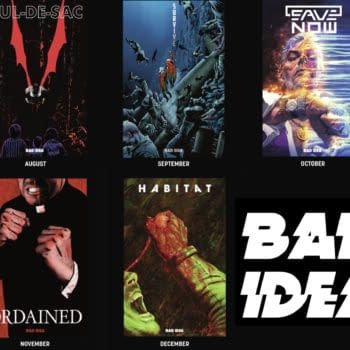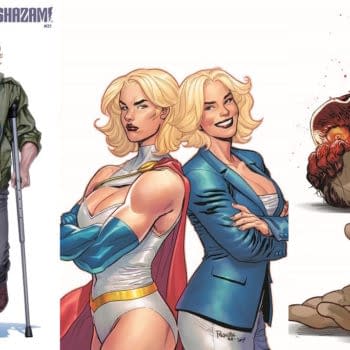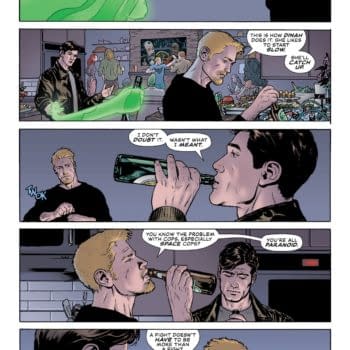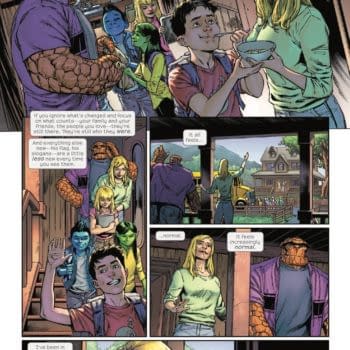Posted in: Comics | Tagged: chuck dixon, Comics, entertainment, frank miller, marvel, Marvel Comics, politics
Frank Miller Would Like Another Stab At Captain America. Would Marvel Let Him?
Chuck Dixon is a prominent conservative comic book writer. Paul Rivoche is a comic book artist. Together, they fight liberals.
They wrote a joint article published in the Wall Street Journal taking comics, specifically superhero comics to task for being too liberal, taking the 2011 issue of Superman where he rejected his US citizenship as proof of this.
That issue, published in April 2011, is perhaps the most dramatic example of modern comics' descent into political correctness, moral ambiguity and leftist ideology.
And they expressed fear that such expression would not be in the interests of young comic book readers. Running through the history of superheroes in the US, they saw the nineties as when it all changed.
The 1990s brought a change. The industry weakened and eventually threw out the CCA, and editors began to resist hiring conservative artists. One of us, Chuck, expressed the opinion that a frank story line about AIDS was not right for comics marketed to children. His editors rejected the idea and asked him to apologize to colleagues for even expressing it. Soon enough, Chuck got less work.
The superheroes also changed. Batman became dark and ambiguous, a kind of brooding monster. Superman became less patriotic, culminating in his decision to renounce his citizenship so he wouldn't be seen as an extension of U.S. foreign policy. A new code, less explicit but far stronger, replaced the old: a code of political correctness and moral ambiguity. If you disagreed with mostly left-leaning editors, you stayed silent.
Well… Frank Miller got work. If he wanted it. A famously conservative comic book creator, with the release of the trailer for Sin City 2, he took to Reddit to talk about comics and film. When asked,
What is one superhero or villain you have always wanted to write for but have never had the chance?
He replied,
Oooh. That's a tough one. It changes a lot. Sometimes I love minor characters like the Flash or The Atom, he's a hero who gets small, atomic sized, if he wants to. They've all funky powers that serve them well, same way they all run around in their underwear. They've done all the ones I like the best. I love what they've done with Iron Man, I love what they've done with Captain America. Captain America would probably be the one I would most want to do.
And when asked again,
Which legendary comic hero would you like to do a story for?
He stated,
Again, I get back to Captain America, because I find him such a wonderful anachronism. And also, I feel that he features virtues that my country has either lost or misplaced for a very long time. Especially at a time when the country is so clearly threatened, a hero like that is outstanding. I remember telling people at Marvel, just a few days after 9/11, that I hoped they realized what they had there, because Captain America's reaction to 9/11 would have been pretty direct.
Would Marvel let Frank do a Cap story now? He's expressed an interest, it should certainly be possible if a deal could be arranged. Mind you, his most recent Batman book, Holy Terror, was deemed too much for DC Comics and was published elsewhere, with the ears taken off.
For me, the superhero is an inherently conservative concept, even if born from the left wing ideology that informed early Superman. The best selling comic, Batman, is about a successful businessman who takes personal responsibility for the state of his city and considers it his personal duty to take down the criminals who are destroying it.
An individual possessing extraordinary abilities who takes personal duty and responsibility to make the world a better place rather than relying on a government to do so, strikes me as a conservative fantasy, whatever twists and turns a left-leaning creator might add.
And to a varying extent that concept of personal responsibilty extends across the genre. With great power, comes great conservative idealism.
Only when the essence of that is criticised, such as in the work of Alan Moore or Warren Ellis, does it become something else.
But most superhero comic books are telling fantasy conservative stories to those who enjoy them – even if they don't realise that's what they are. But creators fall in and out of fashion. While Dixon complains that getting less work was down to being conservative, Alan Grant doesn't complain that he doesn't get work because he's a bit of a lefty. But fashions change, editors like to chase the fashionable, leaving many adrift.
And that's a far greater crime.








